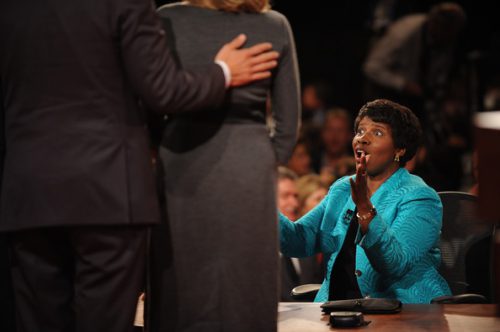
It’s been two weeks since the election ended, though you wouldn’t necessarily guess it from the way election coverage has continued. DZ already covered some initial thoughts on the results, understanding our collective emotional turmoil from a lens of low anthropology. Since then, the vote has been dissected and discussed thousands of ways, and believe it or not, some of those reflections contain glimpses of a law and gospel lens. If for no other reason than posterity’s sake, here are a few links to articles whose contents might be worth a glance.
First off, in The NY Times, Rabbi Michael Learner articulates the role that shame plays on both sides of the political aisle:
Though job loss and economic stagnation played a role in his victory, so did shame. As the principal investigator on a study of the middle class for the National Institute of Mental Health, I found that working people’s stress is often intensified by shame at their failure to “make it” in what they are taught is a meritocratic American economy… So while the upper twenty percent of income earners may be progressive on issues of discrimination against the obvious victims of racism and sexism, they are blind to their own class privilege and to the hidden injuries of class that are internalized by much of the country as self-blame.
There are two sides to the law “thou shalt work hard and succeed.” The first side, disadvantaged by geography, unstable family dynamics, or addiction, can’t meet the law’s demands. The second side, emboldened by its own success in the meritocracy, can’t embrace failures without putting their own glory stories in jeopardy. Like the two prodigal sons–one who refuses to obey the law, the other who upholds the law for selfish ends–neither come off as righteous, but both are still loved by the father. See also, as a vicarious winner of this election, Andy Crouch’s 2015 essay “The Return of Shame.”
Another article, one of some great controversy, dives deep into the identity politics that were a cornerstone of the election. The piece, “The End of Identity Liberalism”, is worth noting for one line in particular:
If you are going to mention groups in America, you had better mention all of them. If you don’t, those left out will notice and feel excluded.
In a similarly controversial article from The Atlantic:
When everything is about identity politics, is the left really surprised that on Tuesday millions of white Americans, for the first time ever, voted as “white”? If you want identity politics, identity politics is what you will get.
Which is to say, the only real question on any human being’s mind is “is this for me?” That is not an abstract question, and it’s not really a selfish question either. It’s a question of love and survival. Regardless of race, gender, geography, or disadvantage, it’s the question that motivates us all. If the grace of God were only limited to a demographic–say, those who had undergone ritual circumcision, those who maintained religious purity, those who were sons of a certain father–it would cease to have any value or meaning. The human soul can catch any whiff of exclusion from a mile away, and it usually responds by taking up its own arms.
Over at The Harvard Business Review, Joan C. Williams weighed in with her own working class tribute. The following observation stuck out especially:
One little-known element of that gap is that the white working class (WWC) resents professionals but admires the rich. Class migrants (white-collar professionals born to blue-collar families) report that “professional people were generally suspect” and that managers are college kids “who don’t know shit about how to do anything but are full of ideas about how I have to do my job,” said Alfred Lubrano in Limbo. Barbara Ehrenreich recalled in 1990 that her blue-collar dad “could not say the word doctor without the virtual prefix quack. Lawyers were shysters…and professors were without exception phonies.” Annette Lareau found tremendous resentment against teachers, who were perceived as condescending and unhelpful.
Professionals order them around every day. The dream is not to become upper-middle-class, with its different food, family, and friendship patterns; the dream is to live in your own class milieu, where you feel comfortable — just with more money. “The main thing is to be independent and give your own orders and not have to take them from anybody else,” a machine operator told Lamont. Owning one’s own business — that’s the goal. That’s another part of Trump’s appeal.
One might rightly lump clergy into that professional category, with the exception of clergy who are wise enough to understand that human beings will forever resent being commanded. See also the 2012 study where 65% of Americans would rather fire their immediate supervisor then receive a pay raise.
David Brooks, one of our favorites, has weighed in with his own slice of humble pie, suggesting that the opinion writing class has some real credibility to reestablish and that it should start with a listening ear. This anecdote from his Gwen Ifill memorium is worth sharing:
The night before Obama’s inauguration in 2009, a group of journalists met in David and Katherine Bradley’s house. At the end of the evening they gathered around the piano and sang civil rights anthems and some hymns. Everybody knew the first stanza to “Amazing Grace,” but only Gwen knew the last three, which she sang alone, in honor of the past labors and future promise.
And also, this:
Unfortunately, if you reduce complex individuals to one thing you’ll go through life clueless about the world around you. People’s classifications now shape how they see the world.
Rebinding the nation means finding shared identities, not just contrasting ones. If we want to improve race relations, it’s not enough to have a conversation about race. We also have to emphasize identities people have in common across the color line. If you can engage different people together as Marines or teachers, then you will have built an empathetic relationship, and people can learn one another’s racial experiences naturally.
That is, the great levelers of life aren’t skin color, but the universal: the need for love, the fear of rejection, the difficulty of life, the anguish of suffering, etc. In other words, the brotherhood of the trenches exists in peacetime too, if we’re in touch with our own daily battles.
 One last piece from Alan Jacobs, courtesy of the The New Atlantis, on the limits of social media in validating identity and the increased hostility of virtue signaling:
One last piece from Alan Jacobs, courtesy of the The New Atlantis, on the limits of social media in validating identity and the increased hostility of virtue signaling:
[Most writing on identity and hostility tends] to emphasize the uncomprehending hostility that people in one ideological camp for people in any other, and the hostility is certainly there, but I wonder if I haven’t missed something — something that underlies the hostility: anxiety.
Think about those people in your Twitter or Facebook feed who post and repost the same beliefs, the same talking points, over and over and over again. Why? What’s the point in this seemingly mindless repetition of the same damned ideas? I am coming to suspect that I have not taken seriously enough the felt limitations of social media as venues for display behavior.
Sorry for the ugliness of the phrase, but that’s as concisely and clearly as I can put the point. Think about it this way: if you spend your days fully embodied in the life of a community, people know who you are. They may like you, they may dislike you, but they know. Embodied community has a lot of bandwidth; communication is enabled through multiple information streams. Consider, in comparison, how thin and weak the interpersonal bandwidth of social media is. You can’t even shout to be heard; every tweet is as loud as every other tweet, and as for Facebook posts, you don’t even know whether they’re showing up in your friends’ timelines. And as Information Theory 101 teaches us, when there’s some doubt about whether a message is getting through, we employ redundancy.
He goes on to outline a fairly thorough vision of how this need to self-validate in a disembodied world blurs the lines between virtue signaling and hostility. It’s fairly convincing stuff, which might explain why a crowd can be whipped up into frenzy, shouting “his blood be on us and our children,” in the year 33 and how you can be branded, at the same time, a communist and a bigot in 2016.
Other big winners for 2016? South Park once again makes compelling TV, and SNL rode its annual four-year presidential election wave like a pro. If there’s anything else out there you think we should see, feel free to post in the comments below.
One final word: a huge shout out to our readership and friends for keeping Mbird a place where, as DZ envisioned, left and right can coexist when they find common ground on their knees!
https://youtu.be/Zrs8uoDmiDk

COMMENTS
Leave a Reply















